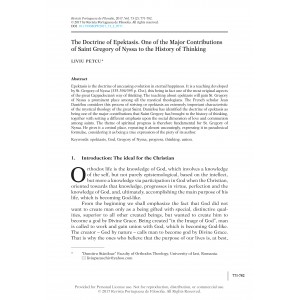The Doctrine of Epektasis. One of the Major Contributions of Saint Gregory of Nyssa to the History of Thinking
Liviu Petcu, “The Doctrine of Epektasis. One of the Major Contributions of Saint Gregory of Nyssa to the History of Thinking,” Revista Portuguesa de Filosofia 73, no. 2 (2017): 771–82, DOI 10.17990/rpf/2017_73_2_0771









